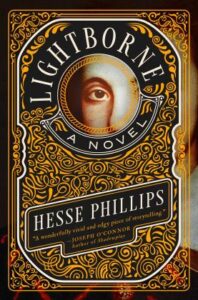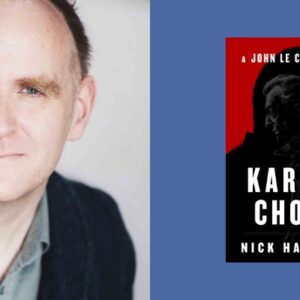“I began with a desire to speak with the dead.”
This quote, from historian Stephen Greenblatt, hung above my desk on a pink Post-It note for ten years. It travelled with me from house to house, city to city, and eventually, country to country, a reminder to myself about why I’d started writing my novel, Lightborne: because of a ghost.
Whatever our rational selves believe, writing about a real historical person—that is, writing about the dead—obliges us to believe in hauntings, at least temporarily. Inspiration comes as visitation, the moment when you look up and sense that a ghost has entered the room. Like any ghost, we are drawn to them, and they to us, by unfinished business. To serve justice, settle a score, unmask a killer, set a record straight. They harass us, they possess us. “Avenge me!” they cry, until our task is done.
In my case, the ghost was that of Christopher Marlowe: poet, playwright, heretic, and, in the parlance of his times, “sodomite,” murdered in 1593, at just twenty-nine years of age. The mysterious circumstances of his death have already kept historians busy for going on a hundred years, ever since certain documents turned up which cast doubt on the official story, that he’d died in a barroom brawl. Perhaps Marlowe was killed in a personal vendetta, or assassinated for his unorthodox beliefs; perhaps it was a hit-job ordered by political or artistic rivals, or an extrajudicial execution ordered by Queen Elizabeth herself. “Good fodder” for a novel, one might heartlessly call such a story. It has everything: a charismatic protagonist, a compelling mystery, the potential for momentous conflict. But strip all that away and what remains is simply a life, cut short.
Before I started working on Lightborne, I’d been hanging onto Marlowe’s story for years, and was simply waiting for lightning to strike. Ultimately, it hit me as an undergrad, while reading Marlowe’s 1593 play Edward II, about a king who loves his male lover far more than his kingdom. Now four hundred years old, Edward II was the first play in English to explicitly portray a queer, romantic relationship between men, a relationship which drops like a nuclear bomb upon a divided, factious England. Crucially, the devastation that Edward II and his lover Gaveston’s affair causes has much less to do with their sexuality than with the power Edward so carelessly wields in battling to keep Gaveston close. At one point, a disapproving courtier asks the king, “Why do you love him whom the world hates so?”
The answer: “Because he loves me, more than all the world!”
In the end, the kingdom is broken, Gaveston murdered, Edward deposed and finally murdered himself, in a barbaric parody of gay sex: raped through the anus with a red-hot spit.
The story of Edward II, who died in 1327, would have been familiar to most literate people of Marlowe’s time, as a cautionary tale, or else a sick joke with an even sicker punchline. What Marlowe’s play attempted that was so revolutionary (beyond merely existing as a queer story in the public eye, in 1593) was to humanize its infamous protagonist. Even at his worst, Edward emerges as a complex and sympathetic human being, corrupted not by “deviant” sexuality, but by power. Marlowe’s play foresaw the psychological complexity that would soon become William Shakespeare’s stock-in-trade. It resurrected a long-dead and much maligned king, and presented his brutal death not as divine justice for his sins, but as the depraved act of a diabolical but ultimately mortal hired killer, named Lightborne.
From the moment Kit Marlowe’s ghost stepped into my room, I knew I wanted to speak with him about queer existence…From the moment Kit Marlowe’s ghost stepped into my room, I knew I wanted to speak with him about queer existence, outside modern notions of queer identity but also, necessarily and unavoidably, in dialogue with them. “Queer humanity,” I would call it. In Marlowe’s lifetime, one could not “identify” on the LGBTQ+ spectrum as one can today, firstly because the terminology simply did not exist; secondly, and perhaps more importantly, the mindset in sixteenth-century England did not recognize the concept of a “self,” in the modern sense. Closest to it would have been the “soul,” which existed only in relation to God. Absolute obedience to Church and Crown, to customs of dress and diet, norms of class, race, sex, and sexual behaviour, were all requirements for earning the right to be considered human—that is, the right to an eternal soul, which would be restored to flesh at the Resurrection. Deviate from those precepts, and the soul is forfeit, humanity along with it.
Marlowe—who wrote lush descriptions of male beauty in Hero & Leander, whose closest adult relationships were all with men, who gave us Edward II, and who, allegedly, did not believe in God, or at least the church—was arguably without soul, without self, according to the mores of his age. His existence was not merely queer in terms of gender expression, sexual behavior or orientation; it was queer as in “divergent,” “disruptive,” “dissident.” His humanity was an act of rebellion.
If his surviving canon is any indication, Marlowe was keenly aware of his outsider status. All his major works treat with the theme of power misused, misappropriated, or run amok, from the high-camp gore of Tamburlaine to the political two-way mirror of The Massacre at Paris. Rather than heroes, Marlowe gives us antiheroes driven mad by power or the quest to achieve it, often brought low in the end by their own overreach. His stages are littered with the victims of his protagonists’ lust to dominate and subdue, victims who are often portrayed with far more sensitivity than the conquerors at centre-stage. Amidst this oeuvre, Edward II is something of an outlier. Rather than desire to rule the world, all Edward wants is to be with the man he loves, and who loves him “more than all the world.”
How exactly Edward II would have been viewed in Marlowe’s own time is difficult to determine. The angry screeds of sixteenth-century “antitheatricalists,” who equated playhouses with brothels and actors with whores, perhaps overstate the degree to which gender and sexuality were fluid on the early modern stage. At the end of every play, according to the Puritan Philip Stubbes, “every mate sorts to his mate… to play the sodomites, or worse.” The prohibition of women from participating in plays certainly made room for a queer sensibility, famously exploited by Shakespeare in his gender-bending comedies. That queer people were involved in the staging of Edward II is practically a given; that queer people were in the audience is a statistical certainty. What did they see, when they saw this play, I’ve often wondered? Did they see themselves? Were they moved? Outraged? Frightened? Was this play, in any sense, written for them?
I, for one, don’t think so. I think Marlowe wrote Edward II for the very same people who, within months of his death, would refer to him as a “dog” and a “devil,” and celebrate his violent end as divine retribution. I believe Edward II is a message from Marlowe to those who would deny him his humanity, and that message—in true Marlovian fashion—is a resounding go to hell.
Whatever Marlowe’s sexuality might have been in real life, for the past four-hundred years, his legacy has remained irrevocably tied to the status of queer people in the wider culture. Sixteenth-century dogma, filtered through Victorian prudishness and mid-twentieth-century paranoia, continue to influence who gets to be fully human in 2024—who is worthy of rights, dignity, and justice. Perhaps this is why a four-hundred-year-old story can feel so urgent. The voices that demonized and vilified Kit Marlowe long ago are anything but silent. In fact, they only seem to be getting louder.
When I began writing Lightborne, I presumed a large part of my task would consist of solving the mystery of Marlowe’s tragic end: the “who,” “how,” and “why.” But to me, the best kind of murder mystery isn’t about monsters and their fiendish motives. It’s about human beings in search of their own humanity, who may fail to find it and give up trying, or find it but fail to keep it, or find it and hold onto it, but at a terrible cost. A good mystery isn’t, in fact, about answers, but questions. Questions are, after all, what keep the dead talking to us.
The truth is, for writers and historians alike, the ghosts we feel looking over our shoulders are often simply our own reflections. Just as Marlowe did in writing Edward II—which is, itself, both a piece of historical fiction, and the retelling of a famous murder—we write to avenge ourselves. To resurrect ourselves. Is there anything more human than that?
***


















